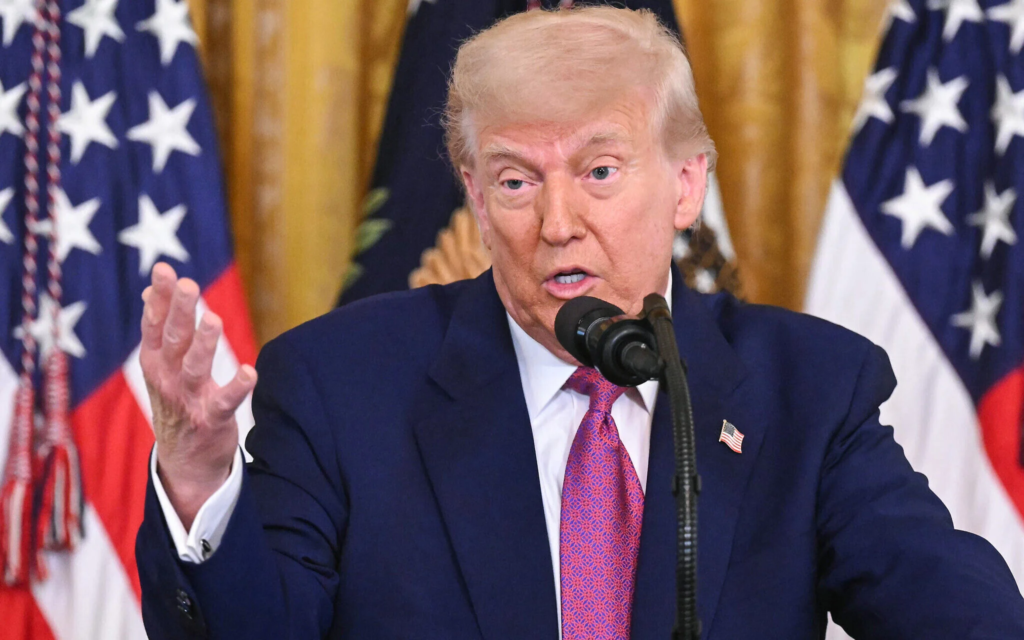Trump on Israel-Iran Conflict is making headlines again after former U.S. President Donald Trump said he would be open to mediating peace talks between the two nations and warned that America might eventually get involved if tensions escalate. His statement came during a recent rally, reigniting discussions about U.S. foreign policy in the Middle East.
This fresh involvement comes at a time when Israel and Iran have reached one of their most dangerous standoffs in recent years, raising global alarms and fears of a broader regional war. Trump’s return to the political spotlight through this potential role as a mediator brings both interest and skepticism, with many watching closely to see how this development unfolds.
Rising Tensions Between Israel and Iran

The situation between Israel and Iran has intensified over the last several months. Israel has accused Iran of backing proxy groups like Hezbollah and Hamas, while Iran has blamed Israel for targeted attacks and assassinations inside its borders. The conflict has spread across Syria, Lebanon, and even the Red Sea.
This week, Iran issued another sharp warning to Israel, claiming that “any aggression would be met with a forceful response.” Israel, in return, vowed to act “with full force” if provoked. Amid this back-and-forth, fears are growing that a full-scale war may be on the horizon, which would impact oil prices, trade, and stability in the entire region.
Trump Offers to Mediate Peace Talks
Trump on Israel-Iran Conflict became a trending search phrase shortly after the former president addressed the issue publicly. Speaking to supporters, Trump said:
“This is a dangerous situation. We don’t want to be dragged into a war, but we might have no choice. That said, I’d be willing to step in and bring both sides to the table. Nobody negotiates better than me.”
Trump also mentioned his past involvement in brokering peace agreements in the Middle East, such as the Abraham Accords between Israel and several Arab countries during his presidency. He emphasized his belief that diplomacy and strong leadership can prevent further conflict.
🇺🇸 U.S. Could Get Involved—But How?
Trump’s comments sparked debate over the role of the United States in this growing crisis. While he is not currently in office, Trump’s influence on U.S. politics remains strong, and many believe he is preparing for a 2024 comeback.
Experts say the U.S. has a range of options if it chooses to get involved:
- Military support to Israel in case of a full-scale attack.
- Imposing more sanctions on Iran to pressure them diplomatically.
- Using backchannel diplomacy to avoid escalation.
- Deploying naval forces in the region for strategic positioning.
However, many also worry that any U.S. involvement could backfire, pulling the nation into another prolonged conflict, similar to past entanglements in Iraq and Afghanistan.
Is Trump the Right Mediator?
While Trump on Israel-Iran Conflict sounds like a dramatic headline, it’s not the first time the former president has offered to mediate international disputes. He previously tried, although unsuccessfully, to open peace talks with North Korea and to manage the Taliban peace process in Afghanistan.
Supporters argue Trump’s direct approach and bold diplomacy style make him a strong candidate for conflict resolution. Critics, however, point to his lack of sustained diplomatic success and unpredictable methods.
Middle East analysts remain divided. Some believe Trump could use his unique relationship with Israeli leadership and past diplomatic track record to broker progress. Others warn that his involvement could provoke further divisions.
Global Reactions to Trump’s Statement
Following his remarks, governments around the world responded with caution. European Union leaders urged all parties to remain calm and pursue diplomatic solutions. Iran dismissed Trump’s offer, calling it “political theater,” while Israeli officials gave no formal comment but noted that “all options” remain open for peace.
China and Russia, who have their own interests in the region, also expressed concern over the potential for U.S. involvement, which could tip the balance of power in unpredictable ways.
Public Opinion in the U.S.
Domestically, Trump’s statements have divided public opinion. A recent flash poll showed:
- 48% of Americans support Trump’s offer to mediate.
- 35% believe U.S. should avoid involvement entirely.
- 17% remain undecided, calling for more information.
The poll also showed higher support among Republicans and conservative voters, who view Trump as a strong leader capable of managing international crises.
What Could Happen Next?

If Trump follows through on his statement, we could see:
- A direct outreach to Israeli leadership to discuss mediation.
- Media interviews and rallies focused on the Israel-Iran crisis.
- Trump proposing a formal peace summit—possibly hosted in a neutral nation like Switzerland or the UAE.
However, as he is not currently in office, any official diplomatic efforts would need to be coordinated with or supported by the sitting administration, which could complicate matters.
Final Thoughts
The world is watching. As Trump on Israel-Iran Conflict becomes a growing headline, the potential for peace—or further chaos—hangs in the balance. Whether Trump can truly act as a neutral mediator is uncertain, but his words have already added a new layer of complexity to an already tense global issue.
If nothing else, Trump’s entrance into this volatile conversation shows one thing clearly: the U.S. is never far from the center of Middle East politics, and its former leaders still carry significant weight on the world stage.
Also Read – SalamAir Flight Suspension: 3 Routes Halted Over Safety Strategy



